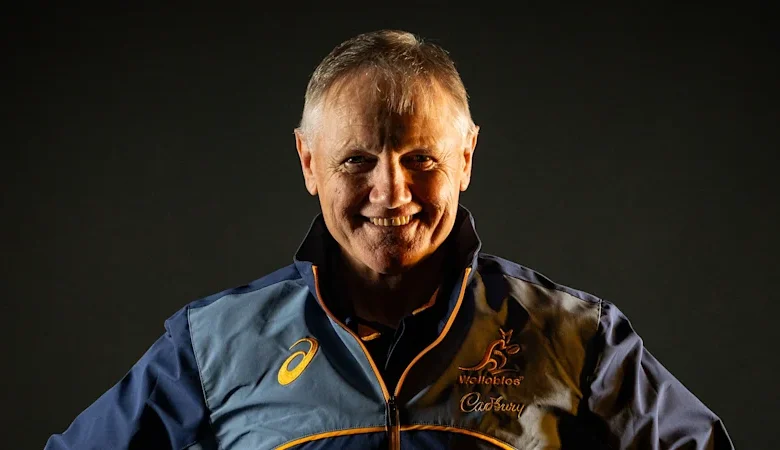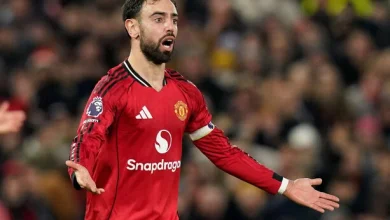‘Luke had been in hospital that week’: The hard times behind Schmidt’s Wallabies journey

Normal text sizeLarger text sizeVery large text size
On a beautiful day in the ancient Italian city of Udine, the Piazza Liberta is bathed in autumn sunshine. While some of the Wallabies join the locals for a coffee, coach Joe Schmidt is hard at work.
He takes a keen interest in history and culture, but for now, his mind must remain on the job inside the hotel: there are meetings to lead and game plans to review for hours to come.
Schmidt has prided himself on his work ethic since he was a boy, when he pumped the pedals of his bike across his small home town of Woodville in New Zealand, delivering newspapers six days a week in all weather, or later working as a runner at the town’s racecourse or as a teacher and a coach.
Wallabies head coach Joe Schmidt is known as a hard taskmaster, but he may have mellowed during his time with the Wallabies.Credit: Getty Images
At the summit of Test rugby, leading the Wallabies, old habits die hard.
The curtains are drawn in the hotel’s conference room, but Schmidt arrives with a smile and two flat whites. Time has been chiselled out of a brimming appointments diary for a chat. Charities and rugby clubs all over Ireland want a piece of Schmidt when he returns for the penultimate match of Australia’s spring tour on Sunday (7am AEDT), so it’s now or never.
The New Zealander’s time in charge of the Wallabies – and possibly in coaching – will end in July. The world of coaching is very different now to the one he entered more than two decades ago.
“Things change in the game; things change generationally,” he says. “I’ve been around so long that there are different generations.
“When I first started coaching Super Rugby, we had guys who had worked for a living before they’d become professional, [while] some of them had come straight out of school and into academies. So, I think they had a different sense of gratitude to be doing something they loved, whereas there’s probably more, I wouldn’t call it expectation, but now in their working life they’ve only really known rugby, and it can be a bit narrow and that’s why we always try to do other things …
“For me as a coach, I think I’ve just tried to retain a growth mindset – watching others, see what they do in coaching and be observant.
“[Dutch soccer legend] Johan Cruyff said that coaching is observing, and I try to just observe their interactions, their connections, their individual preparation and then just try to help them, even at the start of the week with the leadership group. What do you need from us? How can we help you be as good as you can be on Saturday, and then go from there.”
Schmidt was appointed Wallabies coach in January 2024, taking on a team largely shorn of confidence after the disastrous 2023 World Cup under Eddie Jones. It was a team that desperately needed more of a carrot than stick approach. Speaking to several Wallabies this year, it is clear Schmidt immediately brought structure, detail and, vitally, care to the role.
It is typical of his coaching philosophy: he is nothing if not demanding.
In six years leading Ireland from 2013 to 2019, Schmidt transformed the team into one of the best in the world, before their thumping 46-14 World Cup quarter-final loss to New Zealand.
His exacting approach came at a cost, though. British and Irish Lions prop Andrew Porter has referenced the tension he felt coming into Ireland camp – counting the speed bumps as he drove up to the team’s base in County Kildare.
Wallabies coach Joe Schmidt has experienced pressure in Dublin as a coach with Leinster and Ireland.Credit: Getty
Does Schmidt believe this characterisation is fair?
“When you’re coaching internationally, you train Tuesday and Thursday, and then you play on a Saturday and you might set yourself up a bit on a Monday with some meetings and maybe just walking through and getting yourself sorted,” Schmidt says.
“I’d say if you’re not demanding on a Tuesday and Thursday, you’re not actually preparing them for what’s coming.
“If you’re too friendly, and what you walk past is what you accept, and if you walk past behaviours on a Tuesday and Thursday, they’re going to emerge in moments of pressure on a Saturday. So being demanding is part of it.
“But one [Irish] player lost his mum; she passed away suddenly. I spent four hours on a train after the captain’s run on a Friday to get to the funeral in support of him.
“So I think if you talk to that player, for example, the support was there and even Ports [Andrew Porter], I know he might have said that he felt pressure, but he was a younger man then. I think any young man coming into a big game [feels pressure] …
“My self-awareness has probably grown as well. One of the good things about then going into the [Auckland] Blues and going into the All Blacks [as an assistant] was you’re not head coach.
Joe Schmidt had great success with Ireland – but not everyone was a fan of his approach.Credit: Sportsfile via Getty Images
“So you don’t have to hold the line and take responsibility for all the decisions that get made. You can actually be part of propping the player up instead of just saying, ‘Sorry, you’ve missed out this week’, or whatever. They’re always tough conversations.”
For all the detail, depth and structure Schmidt has brought to the Wallabies, he has also leaned into the squad’s infectious sense of fun, notably donning a fake moustache for the team photo to celebrate Nic White’s (first) retirement before the second British and Irish Lions Test in Melbourne, after a difficult defeat in the first game in Brisbane.
There have been great days for the Wallabies under Schmidt, notably beating the Springboks for the first time at Ellis Park in 62 years. Victories like that made the Australian rugby public clamour for him to reconsider his decision to step down in July and continue to the World Cup in 2027. The reality is, that was never a possibility. Schmidt has and will always put his family first, including his wife, Kelly, and his son, Luke, who negotiates life with severe epilepsy.
“That week we won in Ellis Park, it’s hard to beat those [moments],” Scmidt says. “The euphoria of the boys, you kind of feed off that, and I got back to the hotel after that game and I rang Kelly and what I didn’t realise [is that] Luke had been in hospital twice that week.
“He’d had a shocking week and … to be honest, you’ve got that euphoria, and you just want to go home.
The Wallabies celebrate a remarkable victory at Ellis Park.Credit: AP
“But Kelly had said nothing to me all week because she knew that I’d sort of have my head in the game and be trying to help the players prepare.
“Once that’s released, she actually felt a sense of relief being able to tell me. But that makes it tough.
“In the Japan Test [in October], and again, it’s tough, but they [Luke and Kelly] were on their way to the stadium [and] he seized on the bus, so they got off the bus, and he seized getting off the bus, fell onto the pavement. He was on the pavement for 20 minutes in the Tokyo rain, waiting for the seizures to pass after having the medication.
“Kelly’s there with him, gets him back in a taxi and gets him back to the hotel and never actually got to the game. But that’s where she does an incredible job.”
Given Schmidt’s achievements with the Wallabies, he won’t be short of offers when he finally returns home to New Zealand for good in July. For the moment, though, there are no plans to take on any coaching jobs, except perhaps helping out with the odd session at local secondary schools in Taupo.
“Certainly not at the moment,” he says of coaching. “Again, there’s always medical advances, there’s always hope – we always hope that Luke improves, and he has improved.
“He’s on OptiRTP sound therapy at the moment, and we feel like it’s making a difference. It’s extending the periods of time between seizures, and so for us, that’s exciting for him and us that we feel that that’s happened.
Joe Schmidt and Les Kiss, the current and future Wallabies coaches.Credit: Getty Images
“Now, it still doesn’t mean that he can’t go on a cycle of a couple of bad days, which is really tough for him. But it does mean that the days between those might extend out. And so you live in hope that that might happen.”
Schmidt knows his successor for the Wallabies job well: Les Kiss worked with him for Ireland as defence coach, winning back-to-back Six Nations in 2014 and 2015.
As a teacher, Schmidt was renowned for his level of detail in lesson planning. As a coach, he wants to leave the Wallabies in the best shape possible for the World Cup in Australia in 2027.
“Les is very much his own man, as much as we coached together for two years, and I’ve got real respect for him as a technician,” Schmidt says.
“Les is an experienced set of hands, and when I very first spoke to [Rugby Australia chief executive] Phil Waugh and [director of high performance] Peter Horne, I said, ‘I’m just going to look after it [the Wallabies] until the Lions [tour], if that’s what you want from me, and then give it to an experienced pair of hands, and ideally, an Australian’.
“It’s a bit of a Kiwi coach graveyard, doing the Wallabies. I don’t know what they’ll say on my tombstone when I leave, but I’ll be looking to leave the Wallabies in as good a place as possible beyond July next year.
“I don’t know what Les will do, but I’ve got a good idea that he’ll do a really good job. There is a real energy in the group, and a real commitment to each other to try to keep progressing.”
Loading
In Ireland, Schmidt will receive a warm reception on the streets of Dublin. There is also pressure to perform now given successive defeats to England and Italy. Still, if this is Schmidt’s last dance as one of rugby’s top coaches, he is determined to savour every moment. Near the end of the journey, he’s finally able to reflect on just how far he’s come.
“I know it’s an old story, but I never wanted to be a rugby coach,” he says. “I’m very ordinary – just an English teacher who kind of fell into it [coaching] with a number of sliding doors moments – and the one thing that I would stand by in all my coaching career is I work hard, and I care about the people I work with, both the staff and the players.”




